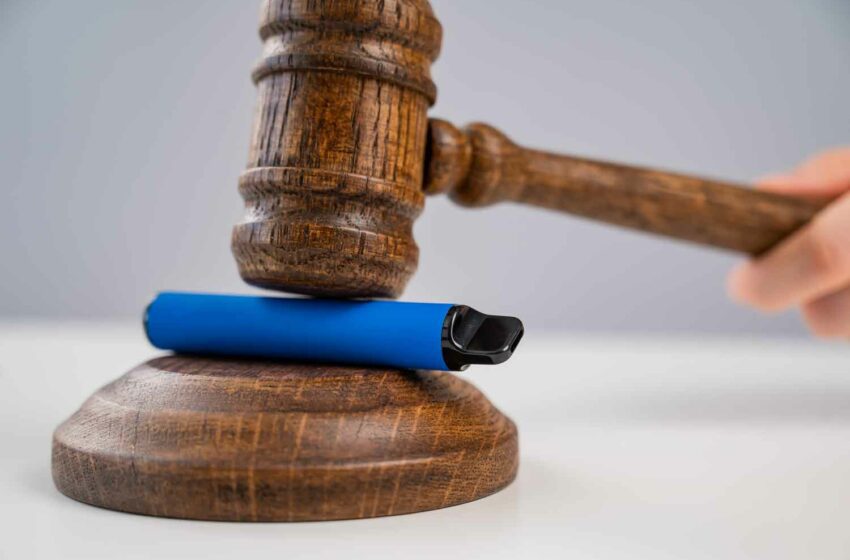
The U.K. will ban disposable e-cigarettes, the government announced today.
According to the government, disposable vapes have been a key driver behind the rise in youth vaping, with the proportion of 11 to 17-year-old vapers using disposables increasing almost ninefold in the last two years.
As part of the package, the government will also acquire new powers to regulate vape flavors, e-cigarette packaging and product presentation in stores to ensure that they don’t appeal to underage users. Additionally, the government will bring in new fines for shops in England and Wales that sell vapes illegally to children. Vaping alternatives, such as nicotine pouches, will also be outlawed for underage consumers.
In its announcement of the new measures, the government also reiterated its commitment to a generational tobacco ban. To help implement the new rules, government agencies such as the Border Force, Revenue and Customs and Trading Standers will receive £30 million ($38.1 million) in new funding a year.
“As prime minister I have an obligation to do what I think is the right thing for our country in the long term. That is why I am taking bold action to ban disposable vapes—which have driven the rise in youth vaping—and bring forward new powers to restrict vape flavors, introduce plain packaging and change how vapes are displayed in shops,” said ,” said Prime Minister Rishi Sunak.
“Alongside our commitment to stop children who turn 15 this year or younger from ever legally being sold cigarettes, these changes will leave a lasting legacy by protecting our children’s health for the long term.”

While action to prevent youth access to vaping is critical, this move smacks more of a desperate attempt by the government to sacrifice vapers for votes ahead of the upcoming general election.
John Dunne, director-general, UKVIA
Public health officials welcomed the government’s decision. “We’re delighted that the Westminster government has heard our calls and is rightly prioritizing the health and well-being of our children and the planet,” said Mike McKean, vice president for policy at the Royal College of Pediatrics and Child Health. “Bold action was always needed to curb youth vaping and banning disposables is a meaningful step in the right direction. I’m also extremely pleased to see further much needed restrictions on flavors, packaging and marketing of vapes.”
Representatives of the vape industry, by contrast, were dismayed, pointing to significant role disposable vapes have played in bringing the U.K.’s smoking rates down to a record low.
“While action to prevent youth access to vaping is critical, this move smacks more of a desperate attempt by the government to sacrifice vapers for votes ahead of the upcoming general election,” said John Dunne, director general of the U.K. Vaping Industry Association (UKVIA), in a statement.
“If the government thinks banning disposables will help protect young people, they are completely misguided. This counterproductive legislation will sooner put children at greater risk by turbo-charging the black market and, in turn, making it easier for them to access illicit and noncompliant vapes.”
Pointing to recent research from University College London, the UKVIA said the answer to youth vaping doesn’t lie in counterproductive bans and restrictions, but rather in effective and proactive enforcement of the law which states that it is illegal for vapes to be sold to minors.

We can’t have a two-tier society in which some adults are permitted to buy tobacco and others are denied the same opportunity.
Simon Clark, director, Forest
The government’s continued commitment to a generational tobacco ban, meanwhile, prompted a strong response from smokers’ rights activists, who said the plan infantilizes adults.
A new poll for the smokers’ lobby group Forest found that almost two thirds (64 percent) of adults in Britain say that when people are 18 and legally an adult, they should be allowed to purchase cigarettes and other tobacco products.
“As soon as you are legally an adult you should be treated like one and allowed to buy tobacco, if that’s your choice,” said Simon Clark, director of Forest.
“We can’t have a two-tier society in which some adults are permitted to buy tobacco and others are denied the same opportunity.”
Urging Downing Street to step back from the policy, he added: “Law-abiding retailers will have the difficult job of enforcing this absurd policy that also drives a stake into the heart of traditional Conservative values such as freedom of choice and personal responsibility.”

